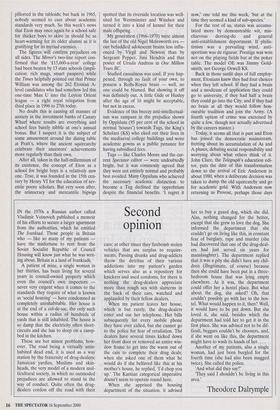Second opinion
IN the 1970s a Russian author called Vladimir Voinovich published a memoir of his efforts to secure a larger apartment from the authorities, which he entitled The Ivankiad. Those people in Britain who — like so many of my patients have the misfortune to rent from the Soviet Socialist Republic of Council Housing will know just what he was writ- ing about. Britain is a land of Ivankiads.
A patient of mine, a single woman in her thirties, has been living for several years in council-owned property which even the council's own inspectors never very exigent when it comes to the standards they require of what is known as 'social housing' — have condemned as completely uninhabitable. Her house is at the end of a cul-de-sac, the only such house within a radius of hundreds of yards that is still inhabited. The house is so damp that the electricity often short- circuits and she has to sleep on a camp- bed in the kitchen.
These are but minor problems, how- ever. The road being a virtually unin- habited dead end, it is used as a way station by the fraternity of drug-dealers: Jamaican yardies, Muslims and skin- heads, the very model of a modern mul- ticultural society, in which no outmoded prejudices are allowed to stand in the way of conduct. Quite often the drug- dealers cordon off the road with their cars; at other times they firebomb stolen vehicles that are surplus to require- ments. Passing drunks and drug-addicts throw the detritus of their various addictions into my patient's garden which serves also as a repository for knickers and used condoms, for there is nothing the drug-dealers appreciate more than rough sex with slatterns in the back of their cars, watched and applauded by their fellow dealers.
When my patient leaves her house, which is but rarely, the drug-dealers enter and use her telephone. Her bills subsequently list every mobile phone they have ever called, but she cannot go to the police for fear of retaliation. The dealers have several times kicked down her front door or removed an entire win- dow frame to get into the warm out of the rain to complete their drug deals; when she asked one of them what he would do if she behaved like this at his mother's house, he replied, 'I'd chop you up.' The Kantian categorical imperative doesn't seem to operate round here.
When she apprised the housing department of the situation, it advised her to buy a guard dog, which she did. Alas, nothing changed for the better, except that she grew to love the dog. She informed the department that she couldn't go on living like this, in constant fear of burglary, rape and murder (she had discovered that one of the drug-deal- ers had just served six years for manslaughter). The department replied that it was a pity she didn't have any chil- dren (illegitimate, of course) because then she could have been put in a three- bedroom house that was lying empty elsewhere. As it was, the department could offer her a hostel place. But what about the dog, she asked? Oh, that couldn't possibly go with her to the hos- tel. What would happen to it, then? Well, it would have to be put down. But she loved it, she said, besides which the department had told her to get it in the first place. She was advised not to be dif- ficult, beggars couldn't be choosers, and, if she went on like this, the department might have to wash its hands of her... .
Another of my patients, also a single woman, had just been burgled for the fourth time (she had also been mugged twice). She called the police.
`And what did they say?'
`They said I shouldn't be living in this area.'
Theodore Dalrymple


































































 Previous page
Previous page